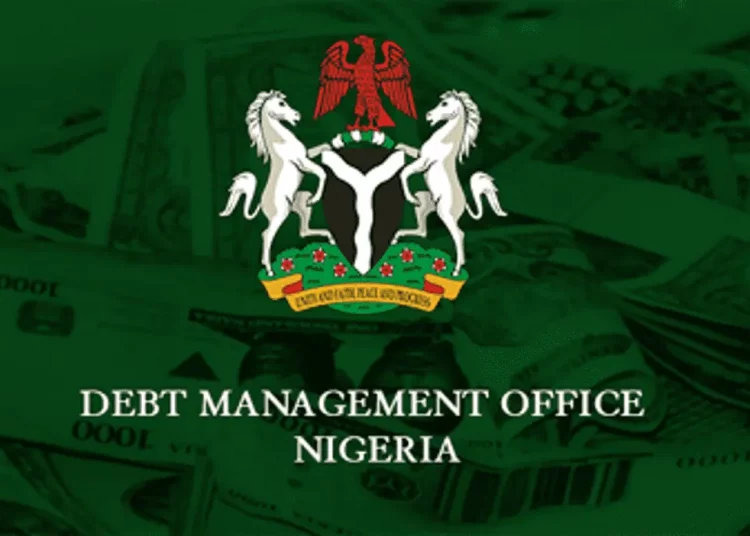Nigeria’s Debt stock has been on a steady rise with the latest figure from the Debt Management Office (DMO) showing that the nation’s total debt rose by N2.044 trillion in the first quarter of 2022.
This is as the federal government of Nigeria, in the first three months of 2022, had spent N898.628 billion in servicing both its external and domestic debt obligations which currently stands at N41.6 trillion, raising more concerns on the sustainability of the country’s debt.
The International Monetary Fund(IMF) had recently warned that, with the rate at which Nigeria’s debt portfolio is expanding, the country may be spending all its revenue on servicing debt in the next four years.
The amount the federal government spent on servicing its domestic debt between January and March this year stood at N668.685 billion as against N310.497 billion that was expended in the last quarter of 2021.
While the amount spent on domestic debt had grown by 115.4 per cent compared to what was spent in the last quarter of 2021, it was 9.3 per cent higher than N612.712 billion expended in the first three months of 2021.
The amount spent on servicing external obligations however rise significantly on payments on the several Eurobonds that had been raised by the government. Data released by the DMO showed that total amount spent on external debt servicing stood at $548.789 million translating to N229.94 billion at a conversion rate of N419/$.
This is against $286,352 that was used to service the external obligations of the country in the last quarter of 2021 and $1.003 million expended in the first three months of 2021. Data showed that servicing the Eurobonds raised by the federal government cost the country $246.161 million as against $157,012 and $703,036 in the last and first quarter of last year respectively.
Payments to bilateral creditors between January and March this year stood at $129.29 million of which $124.568 million was paid to the Export Import Bank of China. Multilateral creditors were also paid $173.337 million during the period under review.
The federal government plans to spend N3.9 trillion of the N16 trillion 2022 budget on servicing its debt obligations, a development which has raised concerns that the country may soon run out of room to finance its debts.
According to latest data released by the DMO, on its website, the total public debt stock as at March 31, 2022 rose to N41.60 trillion or $100.07 billion.
The amount represents the Domestic and external debt stocks of the federal government, the 36 state governments and the Federal Capital Territory (FCT). The comparative figures for December 31, 2021, were N39.56 trillion or $95.78 billion.
Nigeria’s debt stood at N39.556 trillion or $95.779 billion as at December 31, 2021, when the debt stock grew by N6.641 trillion (from N32.915 trillion or $86.392 billion at 31 December, 2020 to N39.556 trillion in 2021).
DMO said the latest debt figure includes new domestic borrowing by the current administration to part finance the deficit in the 2022 appropriation Act, the $1.25 billion Eurobond issued in March 2022 and disbursements by multilateral and bilateral lenders. There were also increases in the debt stock of the state governments and the FCT.
With the latest figure, Nigeria’s total public debt to Gross Domestic Product (GDP) rose 23.27 per cent. It is however below Nigeria’s self-imposed limit of 40 per cent.
The debt office said the momentum by the government to grow and diversify revenues remains a priority to ensure that public debt is sustainable.
“Initiatives in this regard are yielding results as actual revenues for January to November 2021 at N5.51 trillion was 39.21 per cent more than the N3.96 trillion recorded in 2020. Similarly, the share of Non-oil Revenue grew to 80 per cent compared to 61 per cent in 2020,” the DMO said in a reaction to the development.
The IMF representative for Nigeria, Mr Ari Aisen, during the public presentation of the IMF’s Regional Economic Outlook for Sub Saharan Africa Spring 2022 Issue, entitled “A New Shock and Little Room to Maneuver” recently had noted that, upon conducting a macro-fiscal stress test, the interest payments on debts could amount to Nigeria using 100 percent of its revenue to service debt by 2026 if not closely monitored.
Urging Nigeria to prioritise its debt, inflation, growth and foreign exchange management in the short-term, he said, Nigeria’s debt to service ratio currently stands at 89 per cent, a stretch away from the 50 per cent target of the government.
“I think the biggest critical aspect for Nigeria is that we have done a macro-fiscal stress test, and what you observe is the interest payments as a share of revenue and as you see us in terms of the baseline from the federal government of Nigeria, the revenue almost 100 percent is projected by 2026 to be taken by debt service.
“So, the fiscal space or the amount of revenues that will be needed and this without considering any shock is that most of the revenues of the federal government are now in fact 89 percent and it will continue if nothing is done to be taken by debt service. It is a reflection of the low revenue of the country. The country needs to mobilise more revenue to be able to have macroeconomic stability. It has become an existential issue for Nigeria.”





